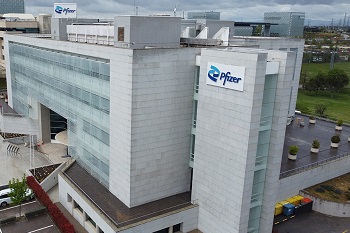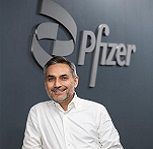Many of the latest medicines developed by Pfizer have benefitted from significant Spanish participation in their research phases.
The Pfizer story began over 175 years ago in Brooklyn, New York (USA). The biomedical company is dedicated to developing therapy areas and vaccines aimed at curing and preventing diseases, or at least alleviating their symptoms. As it always has been throughout its history, the company remains firmly committed to R&D in order to respond to society’s medical needs.
Pfizer’s operations in Spain started up in 1952. Two years later, it opened its first office in Madrid and, in 1961, it commissioned its first factory. Today, Spain plays an important role in the clinical research carried out by the company. In fact, Spain is the country with the second highest number of ongoing studies, with a total of 116. Its biotechnology production plant in San Sebastián de los Reyes (Madrid) is the only one in the Group that manufactures and distributes recombinant drugs to treat haemophilia A and B, which cover the needs of 17,000 patients in over 70 countries.


How did Pfizer’s entry into Spain come about?
Pfizer arrived in Spain in 1952, at a time when the national pharmaceutical market was beginning to take shape. From the beginning, our vision was clear: to provide innovative solutions that improve people’s health and quality of life. The inauguration of our first manufacturing plant in 1961 was a milestone that marked our commitment to the country and its industrial development. Since then, we have grown steadily, adapting to the changes and needs of society. That first stage laid the foundations that make Spain a strategic market in our global network today. Our mission, “innovations that change patients’ lives”, remains the driving force behind our every decision and action.
How has Pfizer’s presence in Spain evolved?
Pfizer has undergone a profound evolution in Spain. From a presence focused on marketing and industrial production, we have progressed to become an international benchmark in research and innovation. With a presence spanning over 70 years in Spain and 176 years globally, we are at the forefront of developing medicines and vaccines, firmly committed to improving the health of millions of people both here and worldwide. Today, Spain holds a strategic position in Pfizer’s global network. In fact, the Spanish subsidiary has a leading role in terms of the number of research projects among Pfizer’s international operations outside the United States – a clear reflection of the confidence placed in our capabilities. This environment not only allows us to make scientific progress, but also to contribute to social and environmental well-being. We are working towards achieving sustainable production, emission reduction and energy efficiency, with the goal of reaching climate neutrality by 2040. We also promote talent and entrepreneurship in healthcare through the Pfizer Foundation. Spain provides us with a robust research ecosystem, highly skilled professionals and cutting-edge technology, these being fundamental pillars that drive innovation and support our daily work. Pfizer is in turn committed to transforming scientific advances into real benefits for patients and their families by building a healthier future.
What key projects has Pfizer undertaken in Spain?
At Pfizer Spain, we are deeply committed to R&D. In 2024, we will spend 54 million euros on R&D and innovation. Today, we have a robust pipeline that includes 54 molecules under development and 116 active clinical trials, involving over 2,590 patients. As a result of this research, many of the latest medicines developed by the company have benefitted from significant Spanish participation in their research phases. We have in addition generated direct employment for 1,145 people. In the field of oncology, in which we have been innovating for over 20 years, we have developed pioneering treatments that have made a real difference for patients, such as the first treatment targeting the ALK gene in lung cancer and the CDK 4/6 inhibitor for metastatic HR+ breast cancer. Our expertise in antibody-drug conjugates (ADCs) is also a source of pride: five of the 13 FDA-approved ADCs come from Pfizer, and almost half of the world’s ADCs use our technology. We also rely on next-generation bispecific antibodies – an essential tool in precision medicine that allows the immune system to better attack tumour cells. In recent years, we have driven other important advances in several areas: the first and only medicine to prevent and treat migraine attacks, treatments for severe alopecia areata and ulcerative colitis, and an innovative solution to prevent respiratory syncytial virus. Spain does in addition house one of the company’s main global technological centres: the production plant in San Sebastián de los Reyes. It is the only Pfizer centre that produces and distributes recombinant drugs to treat haemophilia A and B to over 70 countries, consolidating its position as a global benchmark. We have recently completed the expansion of its facilities with a new aseptic production space equipped with cutting-edge technologies that increase manufacturing capacity. We invested 100 million euros in this expansion. In addition, the plant has state-of-the-art equipment for producing injectable medicines, including automated processes aligned with Industry 4.0 standards, thereby adapting to future regulatory requirements.
What infrastructure do you have in Spain today?
Our infrastructure in Spain reflects Pfizer’s commitment to innovation and global health. We collaborate with an extensive network of research centres, allowing us to drive progress in the development of innovative treatments. In addition, the biotech plant in San Sebastián de los Reyes is a strategic asset in the Pfizer Group. We also have a central office in Madrid and a network of branches in various autonomous communities. This combination of infrastructure, talent and commitment makes Pfizer Spain a key driver in the global Group.
You collaborate with public and private research centres. What is the benefit for Pfizer, for them and for society?
Our R&D work is based on close collaboration with over 840 public and private research centres, forming an essential partnership to drive innovation. In recent years, we have intensified this cooperation, which is reflected in a significant increase in clinical trials and participating centres: in 2025, we will have 116 active trials in Spain, 33% more than in 2021. This is thanks to the strength of our pipeline, which has grown from 41 to 54 molecules under development. For us, these partnerships are much more than cooperation. They are a way of moving forward together. They allow us to share knowledge with professionals and benchmark centres, which drives the development of new therapies. However, our collaboration goes beyond clinical research. We are currently working with over 60 patient organisations on nearly 70 initiatives, both nationally and regionally, to raise awareness and support. We also collaborate with healthcare professionals on training projects, clinical guidelines and scientific events, thereby encouraging a process in which knowledge is constantly updated and shared, and which contributes to improving the quality of care. We believe that progress in health depends on strong partnerships between industry, government, professionals and research. These collaborations, together with updated regulatory frameworks and a culture of working together, are key to accelerating personalised medicine and improving both the access and quality of care.
Pfizer is one of the companies most highly valued by its employees. What are their job profiles in Spain?
Pfizer has around 88,000 employees worldwide, 1,145 of which work in Spain. In Spain, 58% of the workforce are women, reflecting our commitment to diversity, equal opportunities and the creation of teams that are representative of society. This diversity is also reflected in the balance of young and senior talent that characterises our teams. Younger job profiles call for fresh vision and new skills, while the experience of senior professionals is key to tackling the major challenges in healthcare. We also have 123 professionals dedicated to RD&I, working across all phases of clinical research. We know that talent only thrives and brings value in an inclusive and caring environment that fosters well-being and professional development. This is what has led us to renew our Top Employer certification for the fifth consecutive year, with a score of close to 92%, and to be recognised in LinkedIn’s 2025 Top Companies list.
Photos: Pfizer



